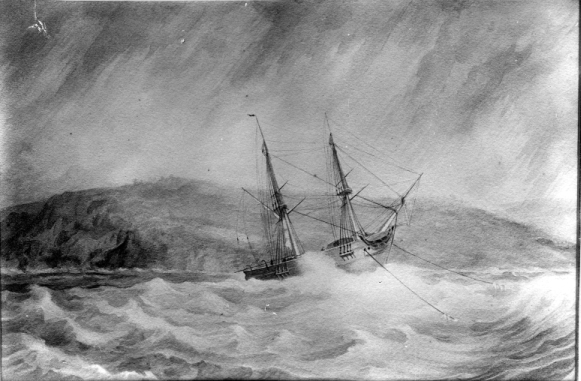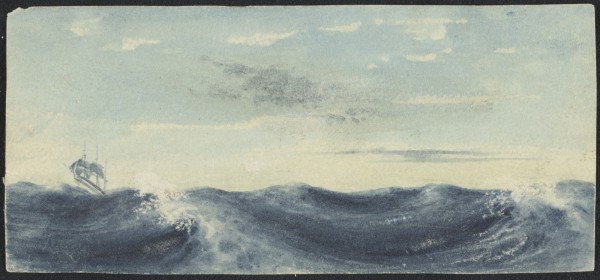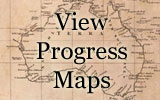In South Australia
Light continues his exploration of the coast, although he is beginning to doubt the existence of the harbour Jones described. For the record he copies Jones’ description into his journal, which allows us to be fairly certain that the anchorage in question is Port Adelaide, but clearly this was not obvious to either Light or Pullen when they first examined it. They head south again, looking for the river one of the Aboriginal women tells them they have missed, but once again they are disappointed. Although it is the Sabbath, Woodforde sets off to do some shooting, excusing himself by arguing that they need the fresh provisions. Carelessly he expends all his ammunition and gets a fright when he comes upon five ‘native huts’. Luckily for him perhaps there is no one there, ‘and we resumed our journey unmolested, but at a quicker pace than we had hitherto walked,’ he writes.
The Rapid heads back to Rapid Bay, where Light is relieved to run into Samuel Stephens and John Morphett, who confirm the arrival of the Cygnet some weeks before. Light can now split his surveying team, leaving him free to examine Port Lincoln while the others continue charting the Gulf. In his diary this week Woodforde gives us an amusing insight into how the others see the Colonial Manager, (who Woodforde refers to as ‘little Stephens (our Nepean Bay friend)’), and how his relationship with Charlotte Beare is regarded. ‘Little Stephens has made the “Literally meaning honourabl compensation, amende honourable was a public apology or reparation made to satisfy the honour of a person wronged.amende honourable ” since we left the Island by marrying a girl whom he had been living with in a discreditable manner’, he writes. It makes us wonder whether this was the general perception of the marriage.

In Woodforde’s diary entry for 13 October we also have the first confirmation that Light is travelling with a ‘lady’. She is Maria Gandy, his partner of some years and she is accompanied by her two brothers William and Edward. Light himself is becoming increasingly anxious at the many delays caused by bad weather and their inability to fix on a suitable harbour. On 15 October he sits down to write ‘to the Commissioners, with a mind worn down with anxiety in consequence of such repeated bad weather checking our work, and the dread of having a host of emigrants out before I knew where to land them.’ On reflection it seems foolhardy to say the least to have sent the surveying party out just a few months ahead of the settlers. The ‘planned settlement’ was not so well planned after all!
At sea
On board the Africaine Mary Thomas sits up all night through a terrifying storm, keeping her own lonely vigil in her cabin. ‘I have often said that I would like to witness a storm at sea,’, she writes, ‘but then I meant myself to be on dry land and only a spectator of the warring elements, for little did I conceive the terrors of such an awful scene.’ Robert Gouger notes Captain Duff’s comment that ‘he never saw the sea higher, or had so severe a gale’. By the next day all is calm again, but it is very cold and they even have a light snow fall. They are near an isolated little island called St Paul’s, a noted fishing spot, and the captain considers a short stop there for some fresh fish, but they are making such good progress that he decides instead to make the most of the fine sailing conditions.

The Buffalo meanwhile is still in Rio. Young Bingham Hutchinson seems to accompany the Governor and his family everywhere. Later we will learn the reason for this. In between his visits on shore he supervises the loading of supplies, some plants intended for trial in South Australia, and yet more livestock. On 12 October they are off once again, although George Stevenson is no happier for his visit to Rio. ‘The Buffalo seems to be in a more inextricable confusion than ever,’ he writes with heavy sarcasm, ‘half the men scarcely sober, then other half fit for nothing from the effects of the gross intemperance they have been permitted to indulge in. A fresh supply of poultry, & as if the poor emigrants had not nuisance around them enough already, eight or ten half grown hogs which the Captain purchased at Rio a bargain have been added for their health and comfort.’ By the next day it seems that half the ship is ready to rise up in protest, as Hindmarsh unwisely tries to reduce their water rations from five pints to four to feed the extra animals, at the same time refusing water to all dogs but his own. ‘But the expression of disgust was too strong & general upon the subject to be resisted’, Stevenson reports, ‘& the order was rescinded in the course of the evening.’ It is hard to know whether Stevenson’s views are widely shared by others on board, but if they are, it is clear that Hindmarsh has made a poor beginning in his role as governor.
Language warning: Please note that these sources contain language which is today considered offensive. It has been retained as it is part of the historical record and evidence of past attitudes.


Just a note about Light’s ‘lady’ companion. Sorry to see that there wasn’t much about her here but then that’s typical of women’s history. Perhaps you’ll be interested to know that the Thebarton Historical Society and residents of Maria Street, Thebarton are working together to create a Maria Gandy Memorial (Colonel William Light’s housekeeper/carer from 1836-1839.